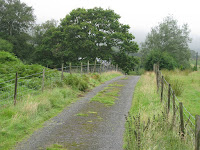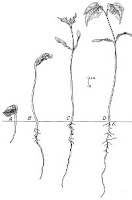< No earlier items |
Index |
Prepare the ground >In the first part of this short series we looked at the steps needed for planting churches. We considered the analogy of planting seeds.Perhaps the first thing to point out is that the churches (plural) are like a garden (singular). That is the way the Lord put it in my mind and that is how I wrote it down. Here are the words again as I received them, 'Planting churches is like growing a garden.'

There is only one garden, I think that is the crucial point. There is not my garden and your garden, the churches I plant and the ones you plant. There is not the Anglican garden and the Baptist garden and the URC garden and the New Frontiers garden. There is not an English garden, an Italian garden, or an American garden - there is just Yahweh's garden.
The garden where he first walked with his people is the same garden in which he will walk with his people at the end of time. And it's also the same garden in which he walks with his people today. This garden is special not because of what it is, but because of who is in it! It is filled with the glorious presence of the Father, the Son, and the Holy Spirit.
Will you walk there with him? That's the question. If you will walk with Yahshua (Jesus) you will be walking in the garden; but you cannot go there without him.
So what are the churches that are 'like' this garden? A church is a place where brothers and sisters live in harmony in the presence of the King, Jesus. We can't all be in one place at the same time because we are spread throughout the world and also through time. A church is his people in relationship with Jesus in a local place and time. Wherever and whenever his people gather around him is church. It's not about us gathering, it's about him being among us. He, not we, define church. If he's not at the centre then although it's a gathering, it's not church.
Take these churches in their entirety and they
are the garden!
Planting churchesWhat the Spirit told me was that planting churches is like growing a garden. I'm not an expert on church planting, I might possibly claim that Jesus involved me as several small groups sprang up. But I can see clearly enough the garden-like aspects of the process.
Step 1 - Obtain some seedsHmm... Seeds. You can buy seeds in a packet, you can harvest seeds from the previous season's flower heads. But in biological terms the process is the same. Seeds can't be manufactured, they must be collected from the fruits of a previous generation. Providing they're stored properly (kept cool and dry) they will remain alive although they are dormant.
So where should we go to obtain seeds to grow a church? We need to find the 'fruits of a previous generation'. If you take a late summer or early autumn stroll through the fields and along the hedges (or in a garden) you will see seed heads and ripe fruits in abundance. If you know what to look for you can collect seeds easily. If you don't know what to look for you may go away empty handed.
Jesus said, 'Look! The fields are ripe for harvest.' (
John 4:34-38) And he said, 'Plead with the Lord of the harvest to send out workers into the field'. (
Luke 10:1-12) Take him at his word! He gives detailed instructions in those verses. Read them. Pray.
There are 'seeds' out there, people already primed with life but dormant. Forget the idea that you have to go out and 'convert' people. People come alive when the Creator breathes his Spirit into them. It's not your job to fill people with life - it's
his job.
Your job is to walk the fields and hedgerows of this world, recognising dormant life and collecting those containing it. You are a seed collector and you have been commanded to call out for the provision of more seed collectors. Together you will collect an abundant harvest of seeds.
Jesus sent out his followers in pairs to walk the fields and hedgerows. And he told them what to look for - 'peaceful people'. They were to look for people who would welcome them, house them, feed them - generous, giving, open people. People like that are already alive. They are alive but dormant. When you find them stay with them. If you don't find them try again in another place, don't even take the dust with you when you leave. Life came from dust and returns to dust. Where there is no life there is only dust - leave it behind.
If you look you will find these peaceful people in many places and at many times through your life. They're out there! Learn to recognise them, begin to notice them, but don't rush on - stay with them. And remember, where you go the Lord has already gone ahead of you.
So think about going out and collecting seeds and next time we'll begin to consider what we should do with these living, dormant seeds once we have found them.
The next post will take a look at
preparing the ground for planting.
< No earlier items |
Index |
Prepare the ground >
 After our usual start of coffee and a chat we began to focus on Yahshua. Quite soon, Sean shared a picture of a storm at sea. Some friends we know are in a storm like this, driving headlong into it. But Yahshua can calm the storm - he's done that sort of thing before! Our friends are moving into the storm but beyond that, everything is calm.
After our usual start of coffee and a chat we began to focus on Yahshua. Quite soon, Sean shared a picture of a storm at sea. Some friends we know are in a storm like this, driving headlong into it. But Yahshua can calm the storm - he's done that sort of thing before! Our friends are moving into the storm but beyond that, everything is calm.











